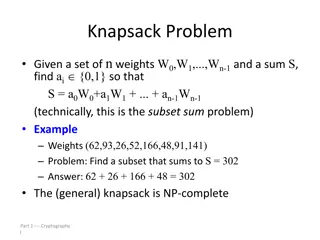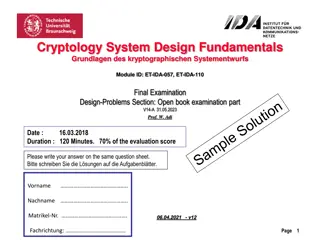Introduction to Cryptography, Cryptanalysis, and Cryptology
Cryptography involves protecting information by encrypting and decrypting data, while cryptanalysis focuses on breaking encryption methods to access hidden messages. Cryptology encompasses both cryptography and cryptanalysis. Encryption encodes messages to prevent unauthorized access, while decrypti
0 views • 12 slides
Introduction to Cryptography: The Science of Secure Communication
Cryptography is the study of methods for sending and receiving secret messages securely. This lecture explores the application of number theory in computer science, focusing on the design of cryptosystems like public key cryptography and the RSA cryptosystem. The goal of cryptography is to ensure th
0 views • 53 slides
Introduction to Cryptography and Its Applications in Computer Science
Cryptography is the study of methods for sending and receiving secret messages. In this lecture, we explore the design and application of cryptosystems, such as the RSA cryptosystem and Turing's Code. The goal is to securely encrypt and decrypt messages using number theory to protect communication f
1 views • 53 slides
Cryptography Concepts and Encryption Methods Overview
Exploring elementary cryptography concepts such as encryption, cryptanalysis, symmetric and asymmetric encryption algorithms like DES, AES, and RSA. Delve into key exchange protocols, digital signatures, cryptographic hash functions, and the process of encryption and decryption in a cryptosystem.
0 views • 23 slides
Understanding the Knapsack Problem and Cryptography
The knapsack problem involves finding a subset of weights that sums up to a given value. It can be applied in cryptographic systems, where superincreasing knapsacks are easier to solve than general knapsacks. The knapsack cryptosystem utilizes superincreasing knapsacks for encryption and conversion
0 views • 14 slides
Overview of Knapsack Cryptosystems and Related Problems
The Merkle-Hellman knapsack cryptosystem is a cryptographic system that was initially proposed by Merkle, and later iterated versions were both broken by Shamir and Brickell in the early 1980s and 1985, respectively. This system is related to the classical knapsack problem, subset-sum problem, and e
0 views • 18 slides
BIKE Cryptosystem: Failure Analysis and Bit-Flipping Decoder
The BIKE cryptosystem is a code-based KEM in the NIST PQC standardization process, utilizing the Niederreiter variant of the McEliece Construction with a QC-MDPC code. It ensures security against IND-CPA, and efforts are made to further confirm or disconfirm its estimates for IND-CCA security requir
0 views • 14 slides
Cryptology System Design Fundamentals: ARSA Cryptosystem Examination Solutions
The given content discusses the solution to an ARSA cryptosystem final examination design problem, involving the computation of public and secret keys for users A and B, encryption and signing of messages, and considerations for attacker interceptions and computations. The solution guides through th
0 views • 18 slides
Insights into the Rowhammering.BIKE Cryptosystem and Decoding Strategies
Explore the Rowhammering.BIKE cryptosystem, its parameters, and the black-grey flip decoder. Learn about the bitflipping algorithm, prior analysis of DFR in QC-MDPC decoders, and strategies for key recovery and decoding in this innovative system. Discover how understanding the error patterns related
0 views • 7 slides








